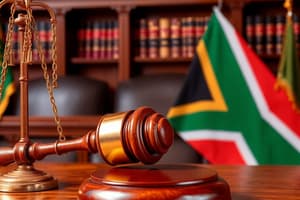Podcast
Questions and Answers
Name three courts established by the Constitution of South Africa.
Name three courts established by the Constitution of South Africa.
Constitutional Court, Supreme Court of Appeal, High Court of South Africa
Who is the head of the Constitutional Court?
Who is the head of the Constitutional Court?
Chief Justice
Where is the seat of the Supreme Court of Appeal located?
Where is the seat of the Supreme Court of Appeal located?
Bloemfontein
Which courts have geographically limited jurisdiction?
Which courts have geographically limited jurisdiction?
What is the core difference between parliamentary sovereignty and constitutional supremacy?
What is the core difference between parliamentary sovereignty and constitutional supremacy?
What is the rationale behind a tripartite separation of powers?
What is the rationale behind a tripartite separation of powers?
What is transformative constitutionalism?
What is transformative constitutionalism?
What does constitutional supremacy imply for a state?
What does constitutional supremacy imply for a state?
What are the key features that have emerged since the coming into existence of the South African Constitution?
What are the key features that have emerged since the coming into existence of the South African Constitution?
What does Section 165 of the constitution state?
What does Section 165 of the constitution state?
What was the judgment in the case of Pharmaceutical Manufacturers of South: In re: Ex parte President of the Republic of South Africa 2000 (2) SA 674 (CC)?
What was the judgment in the case of Pharmaceutical Manufacturers of South: In re: Ex parte President of the Republic of South Africa 2000 (2) SA 674 (CC)?
Describe the importance of knowing the history of the judiciary prior to democracy.
Describe the importance of knowing the history of the judiciary prior to democracy.
Explain the concept of transformative constitutionalism and its role in the judiciary.
Explain the concept of transformative constitutionalism and its role in the judiciary.
Discuss the impact of decolonization on the judiciary and explain its significance.
Discuss the impact of decolonization on the judiciary and explain its significance.
What is transformative constitutionalism?
What is transformative constitutionalism?
What criticism does transformative constitutionalism face?
What criticism does transformative constitutionalism face?
What was the role of the judiciary under the system of parliamentary supremacy in apartheid South Africa?
What was the role of the judiciary under the system of parliamentary supremacy in apartheid South Africa?
What does Section 174 (2) of the Constitution of the Republic of South Africa Act 108 of 1996 provide for?
What does Section 174 (2) of the Constitution of the Republic of South Africa Act 108 of 1996 provide for?
Flashcards are hidden until you start studying
Study Notes
Constitutional Courts in South Africa
- Three courts established by the Constitution of South Africa: Constitutional Court, Supreme Court of Appeal, and High Courts
- The head of the Constitutional Court is the Chief Justice of South Africa
Supreme Court of Appeal
- Seat of the Supreme Court of Appeal located in Bloemfontein
Jurisdiction of Courts
- High Courts have geographically limited jurisdiction
- Magistrates' Courts have geographically limited jurisdiction
Constitutional Supremacy vs. Parliamentary Sovereignty
- Core difference: Constitutional supremacy implies that the Constitution is the supreme law of the land, while parliamentary sovereignty implies that the Parliament is the supreme law-making authority
Tripartite Separation of Powers
- Rationale: to prevent the concentration of power and protect individual rights and freedoms
Transformative Constitutionalism
- Constitutionalism that seeks to transform society and address past injustices
- Focuses on social and economic transformation, in addition to political transformation
Constitutional Supremacy
- Implies that the Constitution is the supreme law of the land, and all laws and government actions must be consistent with it
- Means that the state is bound by the Constitution and must respect and uphold its provisions
Key Features of the South African Constitution
- Bill of Rights that enshrines individual rights and freedoms
- Separation of powers between the legislative, executive, and judicial branches
- Independent judiciary
- Constitutional supremacy
Section 165 of the Constitution
- States that the Constitutional Court has the power to make orders and decisions that are binding on all persons and organs of state
Pharmaceutical Manufacturers of South Africa Case (2000)
- Judgment: The President of the Republic of South Africa does not have the power to unilaterally remove a commissioner from office
Importance of Judicial History
- Knowing the history of the judiciary prior to democracy helps to understand the context and evolution of the judiciary
- Provides insight into the impact of apartheid on the judiciary and the need for transformation
Role of the Judiciary in Transformative Constitutionalism
- The judiciary plays a crucial role in promoting social and economic transformation through its decisions and interpretations
Impact of Decolonization on the Judiciary
- Decolonization has led to a shift from a Eurocentric approach to law to a more inclusive and diverse approach
- Significance: recognition of indigenous and customary law, and the need to address historical injustices
Criticisms of Transformative Constitutionalism
- Faces criticism for being overly focused on social and economic transformation, and not enough on political transformation
- Criticized for being too vague and lacking clear guidelines for implementation
Role of the Judiciary under Apartheid
- The judiciary was subservient to the apartheid regime and did not have the power to challenge its laws and policies
Section 174(2) of the Constitution
- Provides for the appointment of judges by the President in consultation with the Judicial Service Commission
Studying That Suits You
Use AI to generate personalized quizzes and flashcards to suit your learning preferences.



